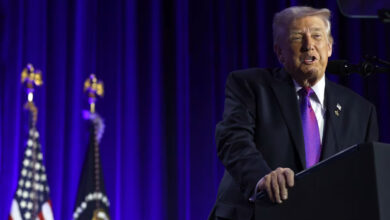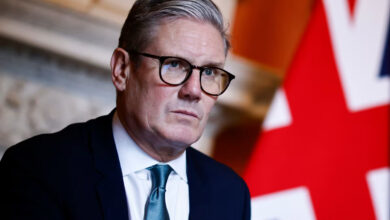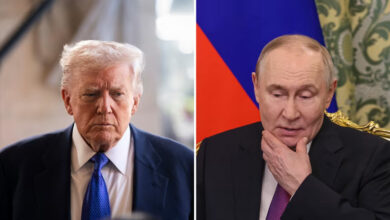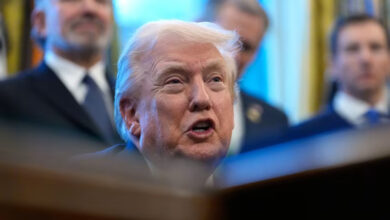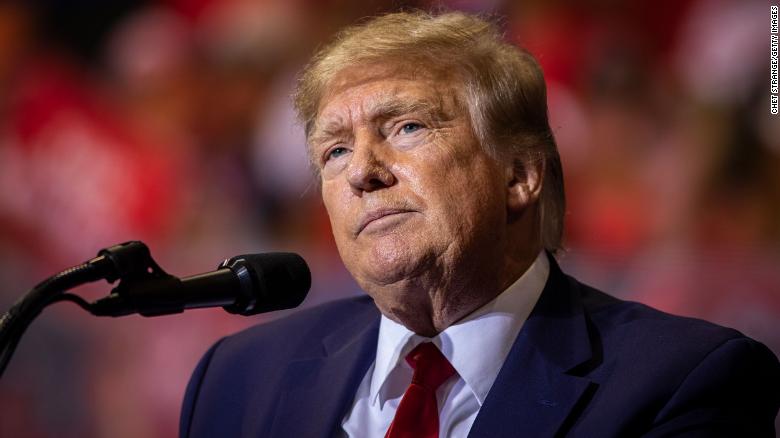
The documents — shared by journalist Bari Weiss as the latest installment of the so-called Twitter Files — appear to show that there was at least some debate among various employees about whether Trump’s final tweets violated the social network’s policies prohibiting inciting violence. But they stop short of showing that Twitter ignored its own rules in implementing the ban.
Twitter’s new owner, Elon Musk, cheered and promoted the release of the internal company documents on Monday and attempted to paint the former Twitter leadership’s decision as politically motivated. In a tweet, he suggested that the former president “didn’t violate the rules” and that the decision was made at the behest of “activist employees.”
The comments come after Musk made the controversial decision last month to reverse the platform’s ban of Trump following a poll of his Twitter followers, after initially saying he would consult a panel of experts on the decision. Musk on Monday also disbanded its Trust and Safety Council, a group of outside experts who consulted with the company on sensitive issues.
A debate over Trump’s ban
Trump’s account was permanently suspended by Twitter two days after the attack on the Capitol conducted by some of his supporters, many inflamed by false claims that the 2020 election had been stolen. At the time, Twitter said the ban was due to “the risk of further incitement of violence.” The decision came after Twitter had long resisted calls to suspend or remove Trump’s account — and instead applied information labels to provide context around his tweets — on the basis that it was important for users to be able to hear directly from a world leader.
Weiss’ tweets suggest that in the wake of January 6, there were Twitter employees both in favor of and against the idea of banning Trump. A screenshot from an internal Twitter slack conversation, where employees’ names have been redacted, shows one employee raising concerns about “censorship” while another notes that “we impose far stricter rules on effectively everyone else on the platform.” It’s not clear from Weiss’ tweets whether the employees in this discussion were in any way involved in the decision making process that led to Trump’s ban.
The tweet thread also indicates that some members of Twitter’s safety team had raised questions about whether the Trump tweets that ultimately led to his ban actually violated the company’s policies.
“I also am not seeing clear or coded incitement” to violence, Twitter safety staffer Anika Navaroli said in a slack message about Trump’s January 8 tweet saying: “The 75,000,000 great American Patriots who voted for me, AMERICA FIRST and MAKE AMERICA GREAT AGAIN, will have a GIANT VOICE long into the future. They will not be disrespected or treated unfairly in any way, shape or form!!!”
(Navaroli later testified to the House committee investigating January 6 that she and other staffers had been alarmed by content posted on Twitter by the Proud Boys and other extremist groups that echoed statements by Trump, and had worried about the risk of violence ahead of the attack.)
Another staffer, whose name was removed in the screenshot, said in Slack that a subsequent tweet that day from Trump saying he would not attend President Joe Biden’s inauguration was also “a clear no vio[lation].” But a different staffer questioned whether that tweet could be “proof that [Trump] doesn’t support a peaceful transition,” according to Weiss’ tweets.
Twitter’s then-head of legal, policy and trust, Vijaya Gadde — who, along with Twitter founder and then-CEO Jack Dorsey, was ultimately responsible for content decisions — asked later on January 8 whether Trump’s “American Patriots” tweet “is being used as a coded incitement to further violence,” following up with requests for “any context or insight” and any relevant past research, Weiss’ tweets show. Twitter’s “scaled enforcement” team also got involved with the evaluation, and questioned whether the Trump tweets could be considered glorification of violence, the screenshots show, which would violate the company’s policies.
‘Thoughtful and careful’
The process of involving multiple staffers and teams and relying on research for high-profile decisions does not appear out of line with how Twitter and other social platforms make content moderation decisions, especially in crisis situations.
“This is how the whole process went … this is not really out of the ordinary,” one former Twitter executive told CNN, noting that the various teams involved in content decisions would push each other to consider context and information they might not have thought of as they worked through how to handle difficult issues. “I think these conversations look like people were trying to be really thoughtful and careful,” the former executive said.
Twitter ultimately said at the time of Trump’s ban that his tweet about American patriots suggested that “he plans to continue to support, empower, and shield those who believe he won the election,” and that the tweet concerning the inauguration could be viewed as a further statement that the election was not legitimate or that the inauguration would be a “safe” target for violence because he would not be attending.
On January 6, Twitter had also warned Trump that additional violations of its rules could result in a permanent ban, something Weiss’ Monday tweet thread did not mention. The thread also does not mention that other, major social platforms, including Facebook, YouTube and Snapchat, also decided to suspend Trump from their platforms in the days following the Capitol attack, and have yet to restore his account.
Weiss’ tweets follow several other “Twitter Files” reports based on internal documents that appear to have been provided by Musk’s team, including internal Twitter emails about the company’s decision to temporarily suppress a 2020 New York Post story about Hunter Biden and his laptop, which largely corroborated what was already known about the incident.

